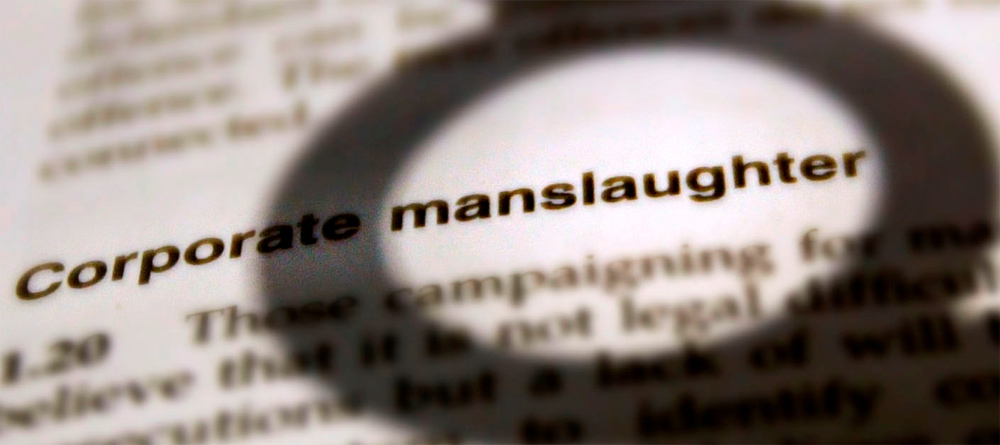Corporate Manslaughter
and
Gross Negligence Manslaughter
Expert Emergency Response Service

The Corporate Manslaughter and Corporate Homicide Act 2007 (CMCHA) has changed the perception many companies of their own responsibilities and risk. Fatal accidents in the workplace occur suddenly and unexpectedly. Those caught up in them often find themselves bewildered by what follows.
An organisation is guilty of corporate manslaughter (corporate homicide in Scotland) if death is caused by a gross breach of its duty of care that is substantially due to senior management failure (see section 1 of the CMCHA). This means that the failures of a number of senior managers/directors can be aggregated to prove a gross breach of the organisation’s duty of care.
Gross breach is defined in section 1 CMCHA as conduct amounting to a breach of duty that
“falls far below what can reasonably be expected of the organisation in the circumstances”.
The CMCH does not apply to individuals only organisations.
Individuals (including directors and senior managers) can be prosecuted for gross negligence manslaughter. In the case of Honey Maria Rose v R [2017] EWCA Crim 1168 the Court of Appeal stated for a defendant to be guilty of gross negligence manslaughter the prosecution must prove:
a) the defendant owed an existing duty of care to the victim;
b) the defendant negligently breached that duty of care;
c) it was reasonably foreseeable that the breach of that duty gave rise to a serious and obvious risk of death;
d) the breach of that duty [substantially] caused the death of the victim;
e) the circumstances of the breach were “truly exceptionally bad and so reprehensible as to justify the conclusion that it amounted to gross negligence and required criminal sanction”.
Directors and senior managers may also be prosecuted under section 37(1) of the Health and Safety at Work etc Act 1974 in the alternative.
Get Control of the Situation Now
Call Charlotte Waters on 0207 993 6960 or Email Charlotte Waters and we will respond accordingly.
Criminal Investigation
Work-related deaths are investigated jointly by the police and the Health and Safety Executive (or other relevant regulator responsible for enforcing health and safety such as a local authority or the Office of Rail and Road) with the police taking the lead. These investigations are governed by the ‘Work-related Deaths: A protocol for liaison’ – see https://www.hse.gov.uk/pubns/wrdp1.pdf.
If there is insufficient evidence to support a manslaughter charge (whether corporate and/or individual) the investigation will be passed to HSE to investigate possible health and safety breaches.
Having helped businesses under investigation for corporate manslaughter, our specialist lawyers understand the impact such an investigation can have on a business and its people.
Strategy
A prosecution may take a number of years before it comes to court. And when it does come to court there will be pressure upon the defendant company (and any individual prosecuted) to state early on its position ie whether it is pleading guilty or not guilty. The implications of prosecution can be significant: high fines, prosecution costs and reputational damage and for convicted individuals the potential of prison.
The strategic decisions taken in the first days after an incident can be crucial.
The preparation work carried out early on in the investigation can be critical to the eventual outcome.
Understanding Police and HSE Powers
It is important to understand the powers the Police or a Health and Safety Executive ("HSE") . While their powers are overlapping they are not the same. The powers of the police are set out in the Police under the Police and Criminal Evidence Act. ("PACE") and the powers of an Inspector of Health and Safety in section 20 of the Health and Safety at Work ect Act 1974. One important difference is that an Inspector of Health and Safety, unlike a police officer, does not have the power of arrest. As a consequence, a suspect cannot be compelled to attend an HSE interview under caution.
Our expert defence lawyers will guide you throughout the process including site investigations, requests for documentation and to interview witnesses and responding to an invitation to an interview under caution and will give you sound tactical advice. Our lawyers will provide advice and representation throughout the prosecution process.
Internal Investigation
Those carrying out a criminal investigation may be entitled to a copy of the duty holder’s internal investigation report. Any report produced shortly after the incident should ideally be written as an interim report. A report only has the potential to attract legal professional privilege (LPP) if the investigation was instigated on the instructions of lawyers acting for the organisation and its dominant purpose is for litigation. Neither the police nor the HSE (or other health and safety law regulator) is entitled to documentation that is subject LPP
Poor internal incident investigations can take an incident from bad to worse. A professional investigation team is highly recommended with knowledge of what to look for and who to speak with.

Sentencing
Companies who find themselves convicted of Corporate Manslaughter are likely to face substantial fines. The sentencing guideline for corporate manslaughter (and also health and safety offences) is the Health and Safety Offences, Corporate Manslaughter and Food Safety and Hygiene Offences: Definitive Guideline For gross negligence manslaughter the sentencing guideline is Manslaughter: Definitive Guideline.
Both are available on the Sentencing Council’s website (https://www.sentencingcouncil.org.uk/)
In 2022 Greenfeeds Limited, a food waste recycling company was convicted of corporate manslaughter following a contested trial in relation to the deaths of two employees in 2016 who drowned while cleaning out a tanker of pig feed and was fined £2m.
In addition to the corporate charges three individuals in management roles were also prosecuted. The account manager and wife of the managing director, Gillian Leivers, received a custodial sentence of 13 years following her conviction for gross negligence manslaughter: she had instructed employees to enter the tank. Her husband Ian Leivers, statutory director of the company, was sentenced to 20 months in prison for a health and safety offence. The transport manager, Stewart Brown, received a 12 months custodial sentence, suspended for two years for a health and safety offence. Both Mr and Mrs Leivers were disqualified from acting as company directors.
Be Prepared
Pre-planning can be critical. Do not wait until it happens to put your retainer in place. The action taken in the immediate aftermath of fatal work-related incident can be crucial. Think about what arrangements you have in place. Do all key staff members know where to go for immediate advise and who to contact out of hours?
FSW Health, Safety and Environmental Law Experts offer clients an expert emergency response service to brief key staff, liaise with investigating authorities (the Police and/or Health and Safety Executive) and put in place a communication network and sound response strategy.
Contact our Emergency Response Solicitors
For more information on FSW's Emergency Response Services, or for details of how you could sign up to the service, please contact us by telephone on 0207 993 6960 or email Charlotte Waters.
Our related Health and Safety services include:
Contact our Emergency Response Solicitors today on 0207 993 6960.